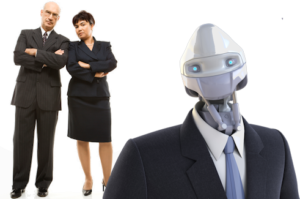In Part 1 of this two-part series, I wrote about the ominous and depressing future predicted to unfold by some pundits as a result of machines, powered by artificial intelligence (AI), unmercifully taking over jobs now held by humans. In this dark future, the number of unemployed workers skyrockets and social upheaval is the ultimate result. In this article, I hope to lift the pall a little bit and describe some of the things that more optimistic futurists say can be done to create a brighter employment picture in the decades ahead. First, it should be noted that some of the predictions about a gloomy future require major breakthroughs in artificial intelligence for them to come true. Nick Jennings, a professor of Computer Science at Southampton University and an expert in agent-based computing and intelligent systems, doesn’t foresee an unexpected breakthrough. “[I don’t see] major shifts,” Jennings told Nick Heath (@nickjheath). “I see a gradual increase in automation and a gradual increase in the software tools that people have to support them in their day-to-day work. I don’t see any non-linearities, I see processing getting better, speeds getting better, more data becoming available and us running more complicated algorithms on that data. I don’t see anything that is going to cause a phase change or a disjunction in one go. Barring a quantum comput[er] appearing, something that really would change the game for everything. I think standard breakthroughs that everyone is going to see, steady, inexorable progress.” [“Why AI could destroy more jobs than it creates, and how to save them,” TechRepublic, 18 August 2014] Although I’m not sure what a “standard breakthrough” looks like, I do know that the future always has a way of surprising us. What we don’t want are nasty surprises.
Regardless of how the future unfolds, I have bad news for people who hate school. Erik Brynjolfsson (@erikbryn), one the pundits who worries about a bleak future, told Heath, “We have to reinvent education and reskilling, and people are going to have to take it upon themselves to more aggressively learn these skills. Because the technology is changing more rapidly, it’s going to be a case of lifelong learning and continuously reskilling.” At least for the near-term, many manual labor jobs and jobs that require a great deal of common sense appear safe. Heath reports:
“Some of the jobs that are poorly compensated today remain exceptionally tricky for robots, as even simple manual tasks like walking over uneven terrain are beyond the capabilities of most modern bots. The phenomenon is known as Moravec’s Paradox, an observation by leading AI researchers in the 1980s that computers found hard the tasks we found easy and vice versa. While it might take a human seconds to fold a towel, a robot made to carry out the task in 2010 took nearly 25 minutes.”
With regards to jobs that require common sense, “David Autor, a leading scholar of labor markets at M.I.T., offers a somewhat more sunny way of looking at things. In a paper presented at the annual gathering of central bankers, … Mr. Autor argues that even as computers have gotten better at rote tasks, they have progressed far less in applying common sense.” [“Why the Robots Might Not Take Our Jobs After All: They Lack Common Sense,” by Neil Irwin (@Neil_Irwin), The New York Times, 22 August 2014] Irwin continues:
“‘Many of the middle-skill jobs that persist in the future will combine routine technical tasks with the set of non-routine tasks in which workers hold comparative advantage — interpersonal interaction, flexibility, adaptability and problem-solving,’ Mr. Autor writes. He specifically mentions medical support jobs, building trades and some clerical jobs that require decision-making rather than typing and filing.”
Another scholar who is optimistic that jobs will be available for human workers is David Hummels, a professor of economics at Purdue University. Steve Tally reports that Hummels insists that “humans still have a unique advantage that machines may never be able to emulate: our ability to respond to other humans.” [“You Won’t be Replaced by a Robot,” Scientific Computing, 8 September 2014] “We have evolved over 100,000 years to be exquisitely perceptive to visual and aural cues from other people around us,” Hummels states, “which is an important skill that machines may never be able to match.” Tally continues:
“In addition, Hummels says evolutionary adaptation has created in humans extraordinary sensorimotor skills that are key components of many occupations. Elevating machines to the point where they could perform jobs, like construction work, that require manual dexterity would require a great deal of innovation. ‘Although we talk about innovation quite a bit, and every company claims to be doing it, path-breaking innovation of the sort necessary to solve problems like dexterous machines is actually quite rare and expensive,’ he says.”
Autor provides the key to unlocking a brighter future for workers — collaboration between humans and artificial intelligence systems. Autor admits that many middle-class skills jobs have been under pressure for some time; however, “[he] argues there’s not much reason to expect it to continue in the future.” Autor stated, “I expect that a significant stratum of middle-skill, non-college jobs combining specific vocational skills with foundational middle skills — literacy, numeracy, adaptability, problem-solving and common sense — will persist in the coming decades.” While that may be good news for some, exploring how man and machine can collaborate in the future remains critical if we are going to create enough jobs to account for jobs lost to automation. Some people might find that prospect disturbing. Charles Pulliam-Moore reports, however, “Researchers from MIT’s Computer Science and Artificial Intelligence Lab found that teams of human workers were at their happiest and most productive when their tasks were directed by robotic artificial intelligence.” [“Human workers report feeling most productive when led by artificial intelligence,” PBS Newshour, 25 August 2014] Purdue’s Hummels offers another reason why you might like working alongside a robot. “There are some rarefied skills that you need in teams and, currently, you might have to put up with a pompous jerk because they have skills that we need,” Hummels says. “As advanced automation allows machines to do many of these tasks, especially in white collar jobs, we won’t have to work with the jerks any longer. If I’m an employer and I have an employee who’s a jerk, I’ll send them on down the road.” The following video discusses the research conducted at MIT.
To read more about why I believe that collaboration between humans and artificial intelligence systems will be a prominent feature of the future work environment, read my article entitled “Cognitive Computing and Human/Computer Interactions.” There are good reasons to be concerned about the future and how automation will affect the job market, but it is often easier to see the down side of situation than it is to see the up side. As Irwin writes, “It is a lot easier to see the jobs that are endangered by emerging technologies than it is the opportunities for new jobs those technologies will create.” After all, most of the new jobs that will be created have no equivalent in today’s workforce.




